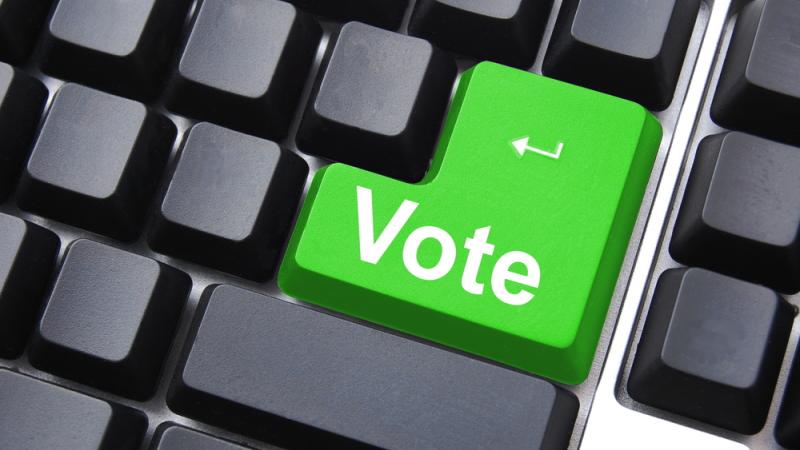
By: Jamie Inferrera
During the November 2014 election, a gubernatorial election year, voter turnout hovered around 41 percent in Pennsylvania. Voter turnout nationwide was also down. This past year’s election in Pennsylvania ranked as the lowest turnout in every since election since 1998. What can be done to encourage Pennsylvanians to register and participate in the electoral process?
One idea, introduced by Senator Lloyd Smucker (R-Lancaster), is to allow Pennsylvanians to register to vote online. In his Senate Floor remarks on the legislation, Senator Smucker noted that online voter registration would “boost voter eligibility, cut costs, and reduce errors.”
Online voter registration is not a new concept nationwide, nor in Pennsylvania. According to the National Conference of State Legislatures (NCSL), 21 states currently offer online voter registration and three states are working to implement a system[i]. In 2002, Arizona was the first state to implement a web-based voter registration system.
Here in Pennsylvania, an online voter registration bill unanimously passed the state Senate during the 2013-14 legislative session. The bill failed to garner House approval before the expiration of the session.
The Mechanics of Online Voter Registration in Pennsylvania
So how exactly would online voter registration work in Pennsylvania? The electronic voter registration form would include the same information as the traditional paper application. However, instead of using an applicant’s handwritten signature to verify the applicant’s identity, the applicant filling out an electronic voter registration form would be required to provide: the last four digits of the applicant’s Social Security number, the applicant’s driver’s license number, or the applicant’s identification number issued by the Department of Transportation. The same verification information would have to be provided for a registered voter to change party affiliation.
An online voter registration application can be submitted at any time. However, applications submitted within 30 days of an election will be held until after the election. The same process currently applies for paper applications. Also within this legislation, the Secretary of the Department of State is given the authority to promulgate regulations for the successful implementation of online voter registration in Pennsylvania.
Arguments in Support of Online Voter Registration
Proponents of online voter registration often cite benefits including reduced costs, enhanced accuracy, and convenience for users. A study of Arizona’s online voter registration process revealed a reduction in per-registration costs from 83 cents per paper registration to three cents per online voter registration[ii]. This type of savings can become critical with tight state budgets and an influx of registrations during a presidential voting cycle.
Additionally, with online voter registration, employees will not have to decipher handwriting on the applications. This will make for reduced error in data input and more accuracy in the voter rolls. Perhaps, however, one of the biggest benefits of online voter registration is the convenience for users. We live in an “on the go” society and many Americans rely on the Internet for nearly everything, ranging from bill paying to grocery shopping. Allowing Pennsylvanians to register to vote and change party affiliations online may increase voter awareness and also increase voter turnout on Election Day.
Arguments in Opposition to Online Voter Registration
As with any policy change, the benefits must be weighed against any potential negative implications. Opponents of online voter registration cite funding concerns, non-qualified applicants registering to vote, and security threats as potential issues with the policy change. Funding is a very legitimate concern. The approximate cost to implement online voter registration in Pennsylvania is $300,000. However, most of the costs associated with online voter registration are “one time” and the change is expected to have an overall reduction in costs in the long term. Funding may also be available through the federal government and the Help America Vote Act.
With the enhanced safeguards in place to verify identity with online voter registration, it will be difficult for an unqualified elector to register to vote. As with paper applicants, each applicant will be checked through the State Uniform Registry of Electors (SURE) system. However, the biggest concern is potential security threats to an online voter registration database. NCSL reported that there are no known breaches of the over 20 existing online voter registration systems[iii]. Further, the Secretary of the Department of State has the authority to promulgate regulations to ensure the safety of an online voter registration database. To enhance security, some states are using “captcha” boxes, where registrants must decode images that a computer cannot decode, to prevent hacking. States are also utilizing data encryption and data logs to monitor any suspicious activity.
Online voter registration is not the end of paper registration in Pennsylvania. The policy change would merely provide Pennsylvanians with an additional, perhaps more convenient, means to participate in the electoral process. Senator Smucker has reintroduced online voter registration as Senate Bill 315[iv]. The legislation has been referred to the Senate State Government Committee.
[i] NCSL: http://www.ncsl.org/research/elections-and-campaigns/electronic-or-online-voter-registration.aspx
[ii] NCSL: http://www.ncsl.org/research/elections-and-campaigns/electronic-or-online-voter-registration.aspx
[iii] Id.
[iv] Senate Bill 315: http://www.legis.state.pa.us/cfdocs/billinfo/billinfo.cfm?syear=2015&sind=0&body=S&type=B&bn=315